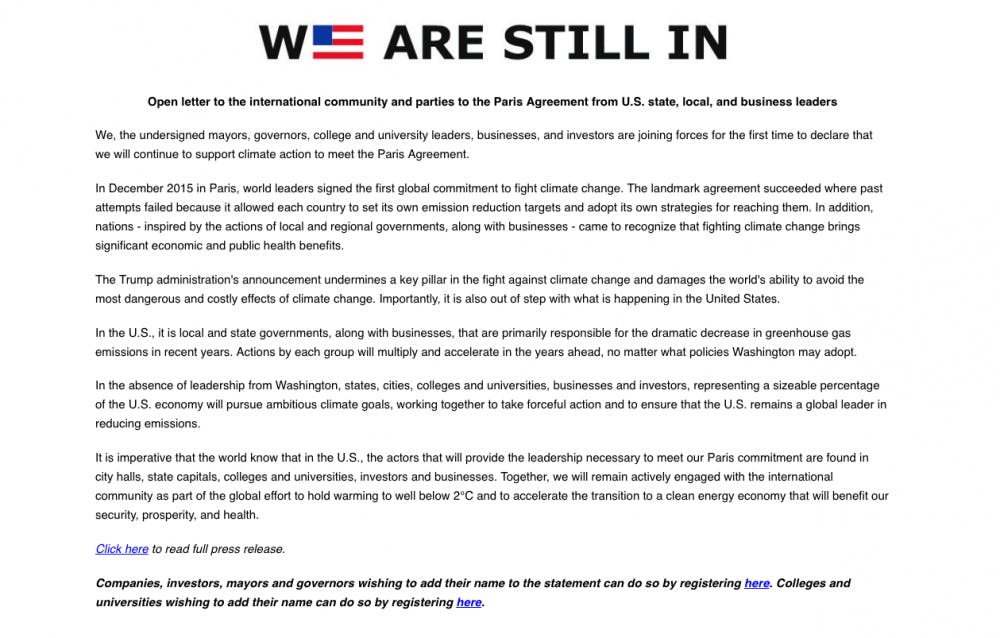Editor's note: President Ronald Crutcher asked that Rob Andrejewski speak on his behalf, as he worked closely with President Crutcher on the University’s response, Cynthia Price, director of media and public relations, told The Collegian after this article was published. The article originally said Crutcher declined to comment.
The University of Richmond has joined the Grand Coalition -- We Are Still In -- composed of over 1,219 governors, mayors, businesses, investors, and colleges and universities in a stand to fight against climate change and comply with the regulations set by the Paris Climate Accord.
“University of Richmond’s 2007 commitment to carbon neutrality, 2010 Climate Action Plan, and 2015 pledge of support to the American Campuses Act on Climate demonstrate our continued leadership in addressing greenhouse gas reductions and our willingness to lead on climate change solutions," Rob Andrejewski, Director of Sustainability, said. "Participation in the Grand Coalition Statement on Paris Agreement aligns with our previous actions, as well as our strategic priority of Stewardship in a Changing World."
The Paris climate accord is an agreement within the United Nations Framework Convention on Climate Change (UNFCCC) that deals with greenhouse emissions, mitigation, adaptation and finance beginning in 2020. The accord was signed by world leaders in 2015, successfully overcoming obstacles they had faced in previous attempts.
President Donald J. Trump pulled the United States out of this agreement on May 27, 2017.
Trump condemned the pact as unfair to American businesses and workers. He described it as “draconian,” and promised to prioritize American economic interests over those of foreign nations.
“I was elected to represent the citizens of Pittsburgh, not Paris,” Trump said.
On Election Day, the president received 40% of the general vote in Allegheny County, Pennsylvania, where Pittsburgh is located.
In response, subnational leaders across the country joined together in opposition of Trump’s decision, including University of Richmond president Dr. Ronald A. Crutcher.
Andrejewski explained that the changes that would be made under this initiative would be minor.
“I think the main change is probably just going to be visibility,” Andrejewski said. “To me, this is a continuation of what the university has had in place for about a decade. What I think we need to do a better job of is communicating these efforts. ... this is really who we are already, what we really need to do is let people know and share what our goals are already.”
Student leaders held different perspectives on the university’s decision.
Enjoy what you're reading?
Signup for our newsletter
“It inspires some hope in me that universities like ours are standing up against an administration that clearly doesn’t care about climate justice or the future of our Earth,” Shannon Kane, president of the College Democrats at the University of Richmond, said. “So I’m very happy that President Crutcher and the administration decided to take a stand against these reckless actions.”
Mason Zadan, chairman of the University of Richmond College Republicans, said he did not think adhering to the Paris agreement was a cogent way to fight climate change. Nonetheless, he said he does not see a problem with the university’s pledge to do so.
“I think that private individuals and private organizations like UR are well in their means to make whatever decision they want to make,” Zadan said. “I can disagree or agree with the effectiveness of this proposal, but I think it’s great that individuals and private businesses have taken it upon themselves to do things they find very important.”
Andrejewski did not view the choice as a political one.
“To me, this should not be a political issue,” Andrejewski said. “This is an issue that we have to be dealing with in an environmental, financial, and social front. ... We need to look at this much more holistically, and I would hope that something like this would not be polarizing but that it would be looked at as the university responding to a leadership challenge."
He said he hoped that the decision would not become polarizing, urging students to work together toward a greener campus.
"We need to deal with these issues as a community," Andrejewski said.
For more information, visit the University of Richmond’s sustainability page.
Contact opinion editors Hunter Moyler at hunter.moyler@richmond.edu and Joshua Kim at joshua.kim@richmond.edu.
Support independent student media
You can make a tax-deductible donation by clicking the button below, which takes you to our secure PayPal account. The page is set up to receive contributions in whatever amount you designate. We look forward to using the money we raise to further our mission of providing honest and accurate information to students, faculty, staff, alumni and others in the general public.
Donate Now



